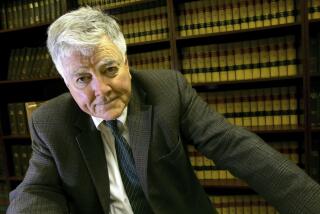PERSONAL PERSPECTIVE : Powell? It Was Hard Persuading Ike to Run
- Share via
NEW YORK — President Bill Clinton used the word funk recently--”I’m trying to get people to get out of their funk.” President Jimmy Carter called it “malaise.” But to me, the word funk brings to mind the late Sgt. Leonard Funk. The American Legion post in Wilkesbarre, Pa., carries his name. But it belongs in presidential history books, too.
Forty-three years ago, the Congressional Medal of Honor, hanging on the star-spangled blue ribbon around the neck of Sgt. Funk, 82nd Airborne, caught the eye of Gen. Dwight D. Eisenhower. The day before the 1952 GOP convention opened in Chicago, the general and his wife, Mamie, were attending a memorial service honoring the paratroopers who had led the Allied invasion on D-day.
The next half-hour proved that history and serendipity teach more than headlines or presidential polls about the political guessing games swirling around Gen. Colin L. Powell. Stephen E. Ambrose, a biographer of Eisenhower, and Charles Kelly, head of Citizens for Powell ‘96, have planted the “Like Ike” line with pundits in Washington and bookmakers in London. As D-day and H-hour draw closer for the Powell family, a Funk factor could trigger a decision.
It was primary day in New Hampshire, 1952. Eisenhower was still in Paris, still in uniform, as commander of SHAPE (Supreme Headquarters Allied Powers, Europe), still “uncommitted”--but nobody ever called him “coy.” He was not even on the Gallup radar.
A week before, we had produced the “We Like Ike” rally at Madison Square Garden. We did it at midnight, after a prizefight. The general and his wife were tied in by radio. Jacqueline Cochran, in her own plane, flew a three-hour kinescope of the rally to Eisenhower, Mamie and close friends for viewing.
Gov. Sherman Adams of New Hamp- shire, Henry Cabot Lodge and a few others had “certified” that the general was a Republican--though Eisenhower had never voted. At the end of that private screening, Cochran stood up and made a toast: “To the next President of the United States!”
Eisenhower agreed to come home, to make one speech, no more. Then he and his wife were going back to Denver.
He made the speech, a near-disaster, in a cloudburst in Kansas. Cochran’s weather man, Irving P. Krick, who had been the general’s met man for D-day, had warned there would be a downpour. Eisenhower, in a yellow slicker, looked like the skipper of a sinking ship. Then, Denver.
We “amateurs” who had staged the Madison Square Garden rally knew if Eisenhower stayed in Denver, Ohio Sen. Robert Taft, the front-runner, would win the nomination. But we found out that the annual candlelight memorial service for the 82nd Airborne Division was scheduled in Detroit on the day before the GOP convention in Chicago. We persuaded the service organizers to move it to Chicago--and to send a group to Denver to invite Ike and Mamie.
It worked. The Eisenhowers would attend only the service--no reporters, no cameras, no newsreels--then, back to Denver. Done deal.
We spent hours the night before the service rehearsing Funk for his five-line introduction of Ike and Mamie. But he couldn’t remember his lines. The more we rehearsed, the more nervous he became. Finally, we cut the intro to 3 lines and wrote it on a card that fit in the palm of his hand.
Still sweating, Adam’s apple bouncing under the Medal of Honor. Show time! Everybody had a candle, lights out, Funk’s candle in his left hand, crib card in his right palm. I escorted the general and his wife to a raised platform, center stage. No music. Silence. Candles. I introduced them: “General, Mrs. Eisenhower, Sgt. Leonard Funk.”
The candles on the podium made the Medal of Honor gleam in the dark. Eisenhower stood eye-to-eye with Funk, saluted him--and the medal.
Funk, flustered, snapped a return salute--and I saw the crib card flutter to the floor! Double trouble. Funk stammered, fumbled for words, but said, loud and clear:
“General, sir, it was so crowded that day, I tried . . . couldn’t get to shake your hand before we jumped. But tonight, sir, I sure would like to shake hands with the next President of the United States!”
Shakespeare couldn’t have written that. Eisenhower shook both his hands, even hugged Funk, then turned to the podium, tears gleaming.
He spoke maybe 15 minutes, a lump in his throat. But as clearly as his famed Guildhall speech about duty, honor, country--and comrades in arms. At the end, that most eloquent applause--absolute silence for about 30 pin-drop seconds--then everyone on their feet. A jumping ovation.
He turned to me, grabbed my lapel and commanded: “Tex, Mamie and I are staying. I want to shake hands with every delegate--their wives, too--wherever you can get them together. Work it out. Understand?”
Then the “professionals” took over. But with $50,000 from John Hay (Jock) Whitney and the phone numbers of a dozen bookies, we had changed the betting odds.
I had met the head of the union of the ushers in the Convention Hall. We had aluminum coins made up to look like silver dollars; on one side, a picture of a growling Taft and the line, “Lose With Taft!”--and, on the other, the face of Eisenhower from a magazine cover, and the line, “Win With Ike!”
Just before the critical nomination vote, all the ushers emptied their pockets of the coins, scattering them from the balconies onto the crowd below. The coins won that “guessing game.”
And we even made some “walking around money”--by betting on Eisenhower before the odds changed.
More to Read
Sign up for Essential California
The most important California stories and recommendations in your inbox every morning.
You may occasionally receive promotional content from the Los Angeles Times.










